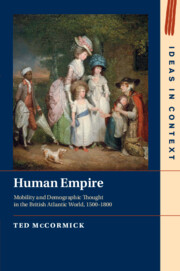Book contents
- Human Empire
- Ideas in Context
- Human Empire
- Copyright page
- Dedication
- Contents
- Acknowledgments
- Introduction Transformations in Demographic Thought
- Chapter 1 Mobility and Mutability in the Early Tudor Body Politic
- Chapter 2 Marginality, Incivility and Degeneration in Elizabethan England and Ireland
- Chapter 3 Beyond the Body Politic: Territory, Population and Colonial Projecting
- Chapter 4 Transmutation, Quantification and the Creation of Political Arithmetic
- Chapter 5 Improving Populations in the Eighteenth Century
- Conclusion Malthus, Demographic Governance and the Limits of Politics
- Afterword
- Bibliography
- Index
Chapter 3 - Beyond the Body Politic: Territory, Population and Colonial Projecting
Published online by Cambridge University Press: 14 April 2022
- Human Empire
- Ideas in Context
- Human Empire
- Copyright page
- Dedication
- Contents
- Acknowledgments
- Introduction Transformations in Demographic Thought
- Chapter 1 Mobility and Mutability in the Early Tudor Body Politic
- Chapter 2 Marginality, Incivility and Degeneration in Elizabethan England and Ireland
- Chapter 3 Beyond the Body Politic: Territory, Population and Colonial Projecting
- Chapter 4 Transmutation, Quantification and the Creation of Political Arithmetic
- Chapter 5 Improving Populations in the Eighteenth Century
- Conclusion Malthus, Demographic Governance and the Limits of Politics
- Afterword
- Bibliography
- Index
Summary
Chapter 3 traces the expansion of demographic governance from ad hoc engagements with specific multitudes to a more systematic approach to the mobility and mutability of populations across expanding imperial territory. Important to this shift was the impact of reason-of-state political thought, notably in the work of Jean Bodin and Giovanni Botero, who both treated policy as an art that could improve upon or perfect nature. Botero drew attention to the instrumental use of colonies in managing population growth, and the chapter turns to English thinking about empire (in Richard Hakluyt’s Discourse of Western Planting and other works) as a solution to the threat of overpopulation – and to early colonial settlements in Virginia and New England as sites for envisioning the transplantation and transformation of excess or idle English people into loyal and industrious colonial subjects. Closing with a consideration of themes raised in Francis Bacon’s Essays or Counsels, Civil and Moral, the chapter argues that by the second quarter of the seventeenth century, demographic governance was seen as a matter of constant management of populations across England and its expanding empire.
Keywords
- Type
- Chapter
- Information
- Human EmpireMobility and Demographic Thought in the British Atlantic World, 1500–1800, pp. 103 - 138Publisher: Cambridge University PressPrint publication year: 2022

